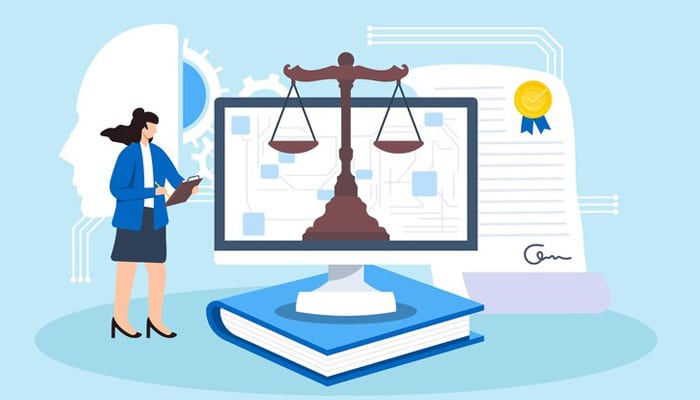Introduction
Ethics serve as the cornerstone of the legal profession, ensuring integrity, trustworthiness, and fairness in legal proceedings. In legal writing, adherence to ethical principles is paramount, as it directly impacts the credibility of legal professionals and the integrity of the justice system. Ethical conduct in legal writing fosters transparency, upholds the rule of law, and maintains public confidence in the legal profession.
This article aims to delve into the critical role of ethics in legal writing, providing insights and guidance to legal professionals on how to navigate ethical considerations effectively. By exploring key ethical principles and practical strategies, the article seeks to equip readers with the knowledge and tools necessary to maintain professionalism and integrity in their written communications within the legal realm. Through case studies and examples, it aims to elucidate ethical challenges and offer practical solutions, ultimately fostering a culture of ethical excellence in legal writing.
Understanding Ethical Considerations in Legal Writing
Definition of Legal Ethics
Legal ethics refers to the moral principles and standards governing the conduct of legal professionals, encompassing their duties to clients, the court, colleagues, and the public. It establishes guidelines for ethical behavior, ensuring integrity, fairness, and professionalism in the practice of law.
Key Ethical Principles Applicable to Legal Writing
- Honesty and Truthfulness
Legal writing demands utmost honesty and accuracy in representing facts, law, and arguments. It entails a duty to refrain from misleading statements or misrepresentation, maintaining the integrity of the legal process and the trust of clients and the judiciary.
- Confidentiality
Upholding client confidentiality is paramount in legal writing. This principle requires safeguarding sensitive information shared by clients, preserving trust and fostering open communication essential for effective representation.
- Fairness and Impartiality
Legal writers must strive for fairness and impartiality, presenting arguments objectively and without bias. This principle ensures that all parties receive equitable treatment under the law, promoting the integrity and credibility of legal proceedings.
- Avoiding Conflicts of Interest
Legal writers must identify and avoid conflicts of interest that may compromise their professional judgment or loyalty to clients. This principle safeguards the independence and ethical integrity of legal representation, preventing conflicts that could undermine the interests of clients or the integrity of the legal system.
- Respect for the Legal System and the Profession
Legal writers have a duty to uphold the dignity and respect of the legal profession and the institutions of justice. This principle entails adherence to ethical standards, procedural rules, and professional norms, contributing to the public’s confidence in the legal system and the integrity of legal practitioners.
Maintaining Professionalism in Legal Writing
-
Clear and concise communication: Effective legal writing demands clarity and conciseness to ensure the reader comprehends complex legal concepts without ambiguity. Succinct language and organized structure enhance the document’s readability and facilitate understanding among diverse audiences, including clients, colleagues, and judges.
-
Proper citation and attribution: Ethical legal writing necessitates the acknowledgment of sources and authorities through accurate citation and attribution. Adhering to citation standards not only respects intellectual property rights but also reinforces the credibility and validity of legal arguments, ensuring transparency and accountability in legal discourse.
-
Avoiding inflammatory language and personal attacks: Professionalism in legal writing entails maintaining a respectful and impartial tone, refraining from derogatory language, or personal attacks. Constructive criticism and reasoned arguments contribute to a conducive legal environment, fostering productive discourse and preserving professional relationships among stakeholders.
-
Respecting deadlines and commitments: Adherence to deadlines is paramount in legal practice, reflecting reliability and integrity. Meeting established timelines demonstrates respect for the legal process, honors contractual obligations, and instills confidence in clients and colleagues regarding one’s competence and professionalism.
-
Adhering to formatting and stylistic conventions: Consistency in formatting and adherence to stylistic conventions uphold the professionalism and credibility of legal documents. Following prescribed guidelines for font, spacing, margins, and citation styles not only ensures compliance with court requirements but also enhances the document’s readability and professionalism.
Ensuring Integrity in Legal Writing
-
Avoiding plagiarism: Legal writers must meticulously cite sources and avoid presenting others’ work as their own. Failure to attribute ideas, language, or research constitutes plagiarism, undermining credibility and violating ethical standards.
-
Authenticity of legal arguments and representations: It’s imperative that legal writers present arguments and representations accurately, without distortion or manipulation. Fabricating evidence or misrepresenting facts not only violates ethical standards but also jeopardizes the integrity of legal proceedings.
-
Full disclosure of relevant information: Legal writers must disclose all pertinent information to ensure transparency and fairness in legal matters. Concealing or omitting relevant facts can distort the truth and compromise the integrity of legal documents and arguments.
-
Ethical considerations in persuasive writing: While advocating for clients, legal writers must adhere to ethical boundaries. This involves presenting arguments honestly and responsibly, avoiding misleading statements or tactics that undermine the integrity of the legal process.
-
Handling sensitive or confidential information appropriately: Legal writers have a duty to safeguard confidential information entrusted to them by clients or obtained during legal proceedings. Mishandling or unauthorized disclosure of sensitive information not only violates ethical obligations but also undermines trust and confidentiality within the legal profession.
Ethical Challenges in Modern Legal Writing
- Impact of Technology on Ethical Considerations
Rapid advancements in technology present novel ethical challenges for legal writers, including issues related to data privacy, electronic communication security, and the authenticity of digital evidence. Furthermore, the widespread availability of online resources raises concerns about plagiarism and the veracity of information used in legal documents.
-
Addressing Potential Conflicts Between Legal Obligations and Client Interests
Legal writers often face ethical dilemmas when the interests of their client conflict with their obligations to uphold the law and maintain professional integrity. Balancing zealous advocacy for clients with ethical responsibilities, such as disclosing unfavorable precedents or advising against unethical actions, requires careful consideration and adherence to ethical principles.
-
Navigating Ethical Dilemmas in Collaborative Writing Environments
Collaborative legal writing environments introduce unique ethical challenges, as multiple authors may have differing perspectives or ethical standards. Ensuring consistency, accuracy, and adherence to ethical guidelines throughout the writing process can be complicated, requiring effective communication, mutual respect, and a shared commitment to upholding professional integrity.
- Balancing Advocacy with Ethical Constraints in Persuasive Writing
Ethical legal writers must navigate the delicate balance between advocating vigorously for their clients and maintaining honesty, fairness, and respect for the legal system. This entails refraining from misleading or deceptive tactics, accurately representing legal authorities and factual evidence, and avoiding appeals to prejudice or emotion that undermine the integrity of the legal argument.
Strategies for Ethical Legal Writing
-
Conducting thorough research and verification: Legal writers should diligently research and verify all factual claims, legal precedents, and citations to ensure accuracy and reliability. Thorough research helps in presenting a well-supported and credible argument, thereby upholding the integrity of legal writing and avoiding misleading information or misinterpretation of the law.
-
Consulting ethics guidelines and professional codes of conduct: Legal professionals must regularly refer to established ethics guidelines and codes of conduct provided by bar associations or professional organizations. Consulting these resources ensures that legal writing aligns with ethical standards and avoids violations such as conflicts of interest, confidentiality breaches, or misrepresentation.
-
Seeking feedback from peers and mentors: Collaboration and feedback are essential for maintaining ethical standards in legal writing. Seeking input from colleagues, mentors, or trusted peers can offer valuable perspectives and help identify potential ethical issues or areas for improvement. Constructive feedback fosters accountability and promotes ethical growth and development within the legal profession.
-
Continuing education and staying updated on ethical best practices: Legal professionals should prioritize ongoing education and stay informed about evolving ethical standards and best practices in legal writing. Engaging in professional development activities, attending ethics seminars, and staying updated on relevant case law or regulatory changes ensures that legal practitioners remain competent and ethically proficient in their writing endeavors.
Conclusion
In the realm of legal writing, professionalism and integrity are not just ideals but essential prerequisites for upholding the rule of law and ensuring justice. This article has underscored the pivotal role of ethics in legal writing, delineating key principles and offering practical strategies to navigate ethical considerations effectively. By adhering to honesty, confidentiality, fairness, and respect for the legal system, legal professionals can maintain credibility, foster trust, and uphold the integrity of the legal profession. Embracing ongoing education, seeking feedback, and leveraging ethical guidelines will empower practitioners to navigate complex ethical dilemmas and promote a culture of ethical excellence in legal writing. As stewards of justice, let us commit to upholding ethical standards with unwavering dedication, ensuring that our written communications exemplify the highest ideals of professionalism and integrity in service to the law and society.







